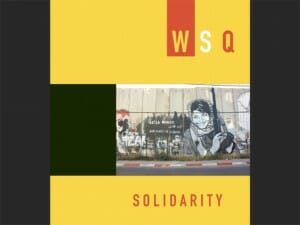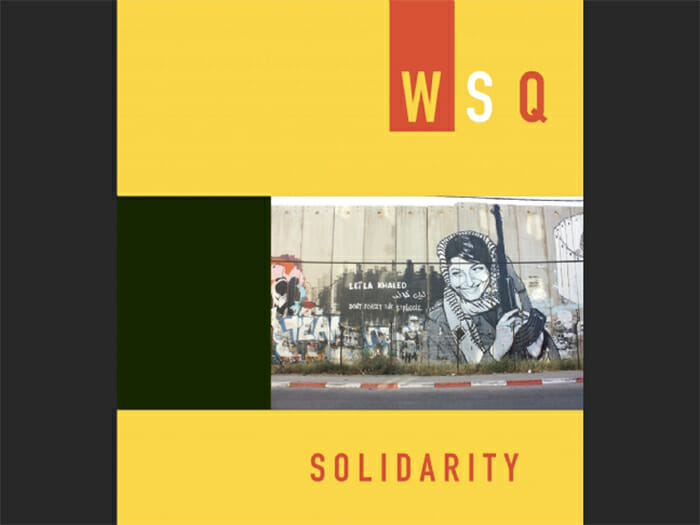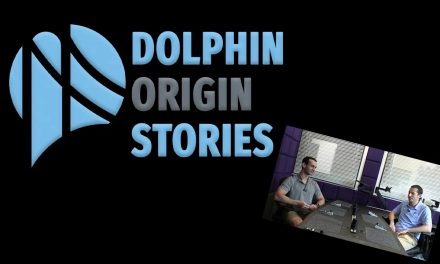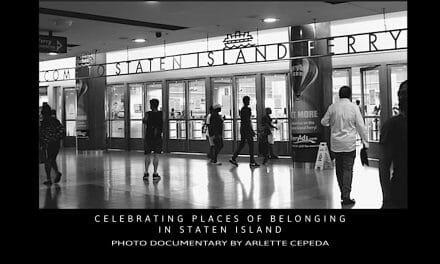
WSQ: Solidarity. WSQ, Volume 42, Numbers 3-4, Fall/Winter 2014. Edited by Saadia Toor & Shefali Chandra.
The Winter 2014 edition of WSQ features College of Staten Island Associate Professor of Sociology and Anthropology Saadia Toor as guest editor, along with co-editors and CSI faculty Associate Professor of Media Studies Cynthia Chris and Associate Professor of Queer Studies and English Matt Brim.
This Fall/Winter issue, entitled “Solidarity,” explores the myriad conditions that compel competing groups to work together for political change. The issue’s introduction states, “Implicit in the meaning of solidarity is a desire to critique authority and confront social justice with an understanding that this can only be done by making alliances across often painful social divisions. This issue of WSQ explores the ways in which communities engage in solidarity with each other.”
Founded in 1972, WSQ, formerly Women’s Studies Quarterly, is a journal published twice yearly by The Feminist Press and has functioned as an interdisciplinary forum for the exchange of emerging perspectives on women, gender, and sexuality. WSQ has become one of the oldest continuous journals regarding women’s issues in the U.S. In the early 1980s, The City University of New York (CUNY) welcomed The Feminist Press offices into what is now The Graduate Center, CUNY and since that time, a strong and lasting partnership was formed. Along with its strong affiliation with CUNY faculty in general, the partnership between WSQ and CUNY has only grown over the years with many of the board members and co-editors consisting of CUNY faculty.
Along, with CUNY, CSI’s involvement has grown as well with the appointment of fellow CSI Professors Chris and Brim as co-editors in January 2014. Professor Chris, who was already a WSQ board member, is a proponent of the journal and is proud of its ability to “make really unique contributions to interdisciplinary feminist and queer scholarship. We strive to have every issue represent an array of academic perspectives.”
WSQ includes all genres of feminist and queer studies discourse. No two issues are alike and that is, according to Prof. Chris, the main draw in working with and reading each issue. “WSQ continues to be a place that intermingles scholarly work with nonfiction, fiction, poetry, as well as visual projects.” Prof. Chris also notes that “the journal places literary art next to scholarship.”
As for the current issue, “Solidarity” was pitched by current co-editors Prof. Toor and Prof. Shefali Chandra, Associate Professor of History at Washington University, St. Louis. Prof. Toor, who is also on the Board, had been thinking about doing a special issue for the journal for several years and pitched the topic of “Solidarity” after she and several of her colleagues and friends had been discussing the various issues facing political and social activists. After years of being politically active herself, she came to the conclusion that “the underlying problem has something to do with solidarity.”
Prof. Toor then spent the following months holding independent research panels about the issue of solidarity before she decided to formalize it for WSQ. Based on her research, “we decided that others must struggle with the idea of solidarity” in terms of activism.
She explained the concept of the issue, saying “Solidarity is a very key issue that requires a sense of empathy by the participants but it also needs some sort of structural alliance building.”
“You can begin by saying you support group ‘x’ because you are the same as group ‘x’ in terms of gender, race, sexuality, etc. However,” she continues, “conflicts and contradictions can occur. With this issue of WSQ, we wanted to provide a space where we can pause and look at a cross-section of these issues.”
Both Profs. Toor and Chris explained that one of the most interesting aspects of being a part of WSQ is being able to share ideas with other faculty from CUNY and beyond. From the moment Prof. Toor pitched the idea for the “Solidarity” issue to the time it went to press, she was very impressed by the efforts of the graduate student assistant editors who shepherded the issue from idea to reality. “The production schedule is very short,” comments Prof. Toor, offering her appreciation for the hard work put into this issue. “I am deeply grateful to everyone involved.”
















